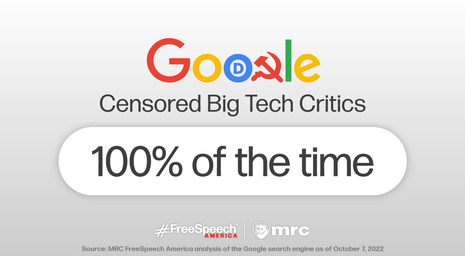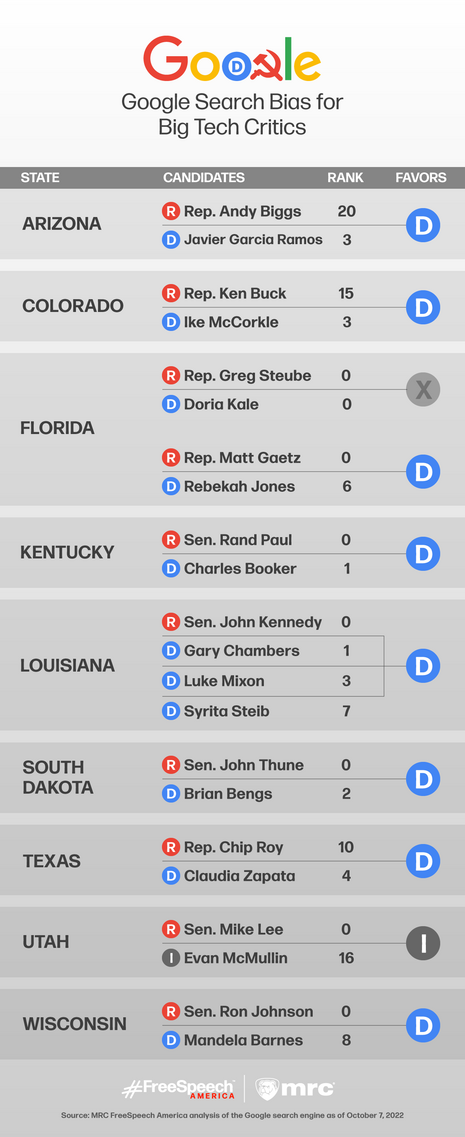Google is burying the campaign websites of its fiercest critics on Capitol Hill. 
Shortly after MRC Free Speech America released its study showing that Google suppressed Senate Republicans’ campaign websites in its search results, it now appears that Google is hitting members of both the House and Senate who have been critical of Google’s tactics. This is happening just as the country is gearing up to vote during the midterm elections on Nov. 8.
"First, Google was caught sending GOP emails to spam. Then we found Google suppressing the campaign websites of Republican Senate candidates. Now, we have evidence that Google is punishing Republicans who dared to speak out or take action against Big Tech by hiding their campaign websites in search results,” said MRC President Brent Bozell. “If this isn’t election interference, I don’t know what is."
MRC Free Speech America analyzed search results from Google, Bing and DuckDuckGo for 10 key congressional races involving current politicians who have aggressively acted against Big Tech, either legislatively or vocally. Our researchers caught Google — again — burying Republican Party campaign websites while highlighting their Democratic and independent opponents’ campaign sites in organic search results. The results follow up on MRC Free Speech America’s previous search engine studies on hotly contested Senate races, and also House races, where polling shows the House does not hang in the balance.
MRC Free Speech America researchers found that Google search results highlighted the Republican’s challenger in all 10 of the total House and Senate races reviewed.
- Google buried the campaign websites of lawmakers critical of Big Tech. Google censored the search results for Big Tech critics 100 percent of the time, either ranking their sites lower than that of their challengers or totally omitting Republican Big Tech critics’ campaign sites from the first page of results entirely.
- Google completely hid seven of the 10 total campaign websites of Republican Big Tech critics in page one organic search results. Seven of 10 Big Tech critics’ campaign websites did not appear on page one results using Google’s organic search. At the same time, Google put 67 percent of the campaign websites of the Big Tech critics’ opponents in the top six items of organic search results.
- Google showed egregious search bias when compared to Bing and DuckDuckGo. By comparison, when performing the exact same searches, Bing’s search results were relatively more neutral. Bing’s results highlighted the Republican opponent’s campaign websites 5 out of 10 times. DuckDuckGo elevated Republican opponents’ campaign websites in 4 out of 10 races.

The suppression could significantly impact the 2022 midterm elections, as over 90 percent of all searches are conducted on Google, according to Business Insider.
The search engine did not show the campaign websites of Republican Sens. Rand Paul (KY) and Ron Johnson (WI) on the first page. Google listed Rep. Andy Biggs’s (R-AZ) campaign website No. 20 when MRC searched for it in a clean environment. All three of the aforementioned Congressional leaders are in the middle of bids for reelection.
Google ranked all three of those lawmakers’ campaign challengers – Democrats Javier Garcia Ramos, Charles Booker and Mandela Barnes – as the No. 3, No. 1, and No. 8 search results, respectively.
“This suppression of our campaign website is just the latest example in a long history of Google and Big Tech bias against conservatives,” Biggs said in a statement to MRC Free Speech America.
Biggs has routinely called out Big Tech censorship, including after Google-owned YouTube removed two days’ worth of speeches during a March CPAC event. He also pledged to break up Big Tech and strip tech platforms of their Section 230 liability protections during the first 100 days of the next congressional term.
“When YouTube censored two days’ worth of CPAC speeches in March, the platform quashed the voices of 17 current and former members of Congress, two potential presidential candidates, including Donald Trump and [Florida Republican Sen.] Rick Scott, among others,” Biggs added. “Manipulating search results has an insidious impact on elections, and will likely persist unless Congress decisively acts to stop these unfair practices.”
Google erased the campaign website of incumbent Big Tech critic Sen. John Kennedy (R-LA) from its first page of search results, while ranking the campaign websites of his three Democrat challengers – Gary Chambers, Luke Mixon and Syrita Steib – at the No. 1, No. 3 and No. 7 spots, respectively. (Louisiana’s primary system puts all candidates on the same ballot, regardless of primary. There’s a runoff if one of the candidates can’t break 50 percent of the vote.)
Kennedy co-sponsored legislation in June to ban Gmail and other email providers from using algorithms that mark certain political campaign emails as spam. A March North Carolina State University (NC State) study showed that Gmail marked 59.3 percent more right-leaning candidates’ emails as spam compared with left-leaning candidates’ emails.
Kennedy has also aggressively hammered the Biden administration’s anti-“disinformation” efforts to target certain information online. He signed a Senate letter advocating to defund the now-terminated Disinformation Governance Board. The Biden administration has worked with Big Tech companies in several capacities to censor so-called “disinformation.”
“The government’s gonna tell us what’s true – what could possibly go wrong?” Kennedy asked during a May 2022 hearing, drawing fierce opposition from Homeland Security Secretary Alejandro Mayorkas.
In a statement to MRC Free Speech America, Kennedy said Google is meddling with democracy through its search suppression.
“If Big Tech is picking winners and losers in its searches, it’s playing a dangerously undemocratic game,” Kennedy said. “People have a right to say what they think and find the information they’re looking for in the public domain. Big companies shouldn’t be able to block, manipulate, or hide that knowledge from anyone.”
MRC Free Speech America Google-searched candidates vying for Wisconsin’s Senate seat and found that incumbent Republican Sen. Ron Johnson fared even worse than the first time MRC Free Speech America did the search on Oct. 7. When MRC searched using Google on Oct. 25, Google did not list Johnson anywhere on the first page of results, but ranked his Democrat challenger Mandela Barnes at No. 8. Google had ranked Johnson No. 13 and Barnes No. 5 during the first search on Oct. 5.
"It's no surprise that Big Tech is putting their thumb on the scale for their preferred candidates,” Johnson told MRC Free Speech America. “They have the ability to impact elections, we've seen this before in 2020 with the suppression of Hunter Biden's laptop reporting and also with COVID-19 lockdowns and school closures. During a September Senate hearing this year, past executives of these companies acknowledged to me their platforms' ability to influence elections. Big Tech needs to be held accountable to the American people and Democrats are not going to be the ones to do it."
Johnson, arguably one of Big Tech’s biggest antagonists, grilled former and current Big Tech executives from Google-owned YouTube in addition toMeta, Twitter and TikTok during a September hearing about topics including social media election influence and censoring COVID-19 information.
The same month, Johnson requested YouTube send internal documents related to censorship of his videos and the multiple suspensions his account received. Google-owned YouTube in 2021 suspended him and later removed a video from his account that discussed potential COVID-19 treatments.
Rep. Ken Buck (R-CO) has proposed antitrust actions, as another option to tackle the bias of Big Tech companies like Google.
Buck introduced the State Antitrust Enforcement Venue Act, which would ensure that antitrust actions initiated by state attorneys general would stay in the jurisdiction they’re brought, instead of transferring to other court jurisdictions. The bill is especially relevant to Big Tech, because antitrust cases involving that industry often transfer to the Northern District of California, a jurisdiction where several tech companies are located and where those companies have received favorable rulings in recent years.
Buck’s bill passed the House in September, and Google appears to be targeting him, too. The platform buried Buck’s campaign website in search results, ranking it No. 15 on the first page of results. Google highlighted his Democrat opponent Ike McCorkle as the third result.
Buck has also worked on a bipartisan basis to advance other antitrust-related legislation to limit acquisitions by the four largest tech companies – Apple, Google, Meta and Amazon – and prevent them from favoring their own products on their platforms.
“Democracy cannot stand if Google – that controls ninety percent of search results – is burying one side or the other,” Buck told MRC Free Speech America. “If they were doing it to Democrats, I’d be upset. But Google isn’t targeting Democrats.”
Potential Legal Violation
Hans von Spakovsky, attorney and Election Law Reform Initiative manager with The Heritage Foundation, stated that Google’s suppression of search results could violate election law.
“It’s illegal for a corporation to make a direct financial contribution to a candidate, but the law and the regulations also prohibit [unreported] in-kind services,” von Spakovsky, a former Federal Election Commission (FEC) member, told MRC Free Speech America. “If, in fact, Google is burying the website and therefore restricting information on one candidate as opposed to another, that’s an in-kind service for that campaign.”
Campaigns regularly hire web experts to ensure their websites rise to the top of internet searches, which candidates must list under U.S. election law, von Spakovsky said.
If Google is systematically suppressing certain candidates, “then yes, that is an in-kind service to a candidate no different from if a corporation were to [help] a candidate,” he said. “This is the typical example of an in-kind contribution that’s illegal.”
The FEC defines an in-kind contribution as a “non-monetary contribution.”
FEC rulings often come down to party lines and legal interpretations of the commissioners deciding the case, Foundation for Accountability and Civil Trust Executive Director Kendra Arnold told MRC Free Speech America.
The case for Google’s search suppression of certain candidates carries an extra layer of complexity because the technology aspect of how Google’s search works would need to be fully explained and proven, she said. Google is notorious for keeping its search algorithms under wraps. Failure to hold accountable Google and the tech industry writ large risks rendering future elections “meaningless” as it would let Big Tech “get away with subliminal manipulation,” liberal psychologist and researcher Dr. Robert Epstein, Ph.D said during 2019 Senate testimony.
Proving an election law violation would be more difficult in the case of Google search suppression, “because by nature it’s less visible and is more factual-intensive than other cases, which are quite simple,” said Arnold, who gave the example of “an advertisement running that everyone can see.”
Google did not respond to an MRC Free Speech America request for comment.
Methodology
For this report, MRC Free Speech America analyzed the Oct. 25 Google, Bing and DuckDuckGo search results of campaign websites of lawmakers identified as critical of Big Tech based on MRC Free Speech America’s reporting. The covered congressional races included Republican Party candidates and their opponents in the following states and districts: Kentucky Senate race, Louisiana Senate race, South Dakota Senate race, Utah Senate race, Wisconsin Senate race, Fifth District of Arizona House race, Fourth District of Colorado House race, First District of Florida House race, 17th District of Florida House race and 21st District of Texas House race.
MRC Free Speech America created an algorithm to automate this process in a clean environment. A “clean environment” allows for organic search to populate results without the influence of prior search history and tracking cookies.
MRC Free Speech America researchers searched each candidate's name with the words “House Race 2022” and "Senate Race 2022" using the algorithm. To determine bias, our researchers looked at Google’s results and recorded the rank(s) of each candidate’s campaign website.
Example(s): “Andy Biggs House Race 2022” and “Javier Garcia Ramos House Race 2022.”
Conservatives are under attack. Contact your representatives and demand that Big Tech be held to account to mirror the First Amendment while providing equal footing for conservatives. If you have been censored, contact us using CensorTrack’s contact form, and help us hold Big Tech accountable.









